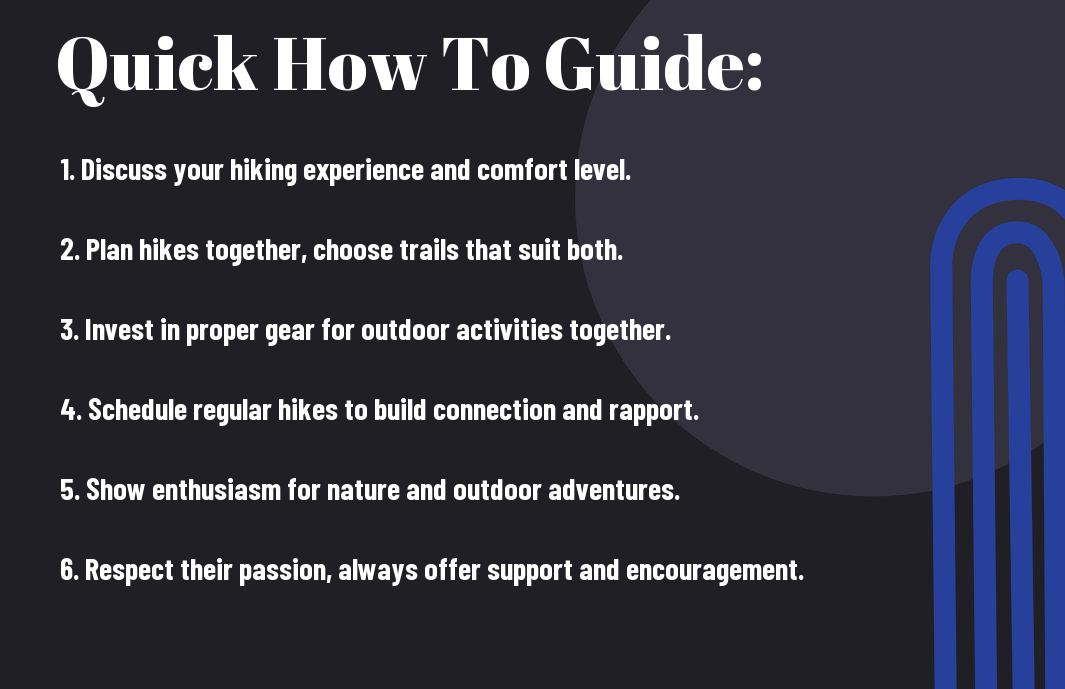Most people who date a hiker quickly discover that it’s more than just a passing interest; hiking is often a significant part of their lifestyle. If you find yourself in this situation, understanding how to embrace this passion while keeping your own interests intact can lead to a rewarding relationship. In this post, you’ll learn how to navigate the dynamics of dating someone with a love for nature, helping you to bond over shared experiences and maybe even inspire you to hit the trails together.
Understanding the Hiking Lifestyle
To truly understand your partner’s passion for hiking, you must recognize it as more than a hobby; it’s a core aspect of their lifestyle. Hiking involves exploring nature, soaking in fresh air, and enjoying physical activity, which can greatly enhance mental well-being. As you embrace this aspect of their life, you’ll gain insight into their values, motivations, and the joy they derive from these treks, fostering a deeper connection between you.
Importance of Hiking to Your Partner
Assuming your partner is an avid hiker, it’s likely that this activity holds significant importance in their life. Hiking serves as a creative outlet, a means of physical fitness, and a way to connect with nature. It’s not just a pastime; it reflects their lifestyle choices and may contribute to their overall happiness. Understanding this can help you appreciate how integral hiking is to who they are.
Common Misconceptions about Hikers
Partner misconceptions about hikers often include the belief that they are extreme adventurers, always seeking thrill in challenging terrains or remote locations. However, many hikes are accessible and can be enjoyed by people of all skill levels. This stereotype can prevent you from appreciating the diverse ways in which your partner engages with hiking—whether it’s a casual stroll or a meticulously planned expedition.
About these misconceptions, it’s vital to recognize that not all hikers fit the mold of grizzled adventurers. Many enjoy the tranquility of easy trails, the beauty of local parks, and the simple joy of spending time outdoors. Hikers can also be social, opting for group hikes or leisurely picnics instead of extreme challenges. Understanding this diverse perspective can help you engage with your partner’s interests more meaningfully, making hiking a shared activity rather than a barrier.

Communicating with Your Hiking Partner
It’s crucial to establish open and honest communication with your hiking partner. Sharing your thoughts and feelings not only strengthens your bond but also ensures that both of you enjoy your outdoor adventures together. Being clear about your expectations, boundaries, and preferences will lead to a more fulfilling experience on the trails. Additionally, keeping the dialogue ongoing can help you navigate any challenges that arise, ensuring that your hiking adventures are delightful for both of you.
Expressing Your Concerns and Interests
To foster a supportive hiking relationship, express your concerns and interests openly. Whether it’s discussing your fitness levels, preferred hiking styles, or any apprehensions you may have, being upfront allows both you and your partner to find common ground. This understanding can help tailor your hiking experiences to fit both of your needs, ultimately making your outings more enjoyable and stress-free.
Active Listening Techniques
Techniques for active listening can greatly improve your communication with your hiking partner. Focus on truly understanding what they’re saying by maintaining eye contact, nodding, and responding appropriately. Ask follow-up questions to show that you value their opinions and feelings. This will not only encourage openness but also help create a positive atmosphere where both partners feel heard and respected.
With active listening, you create a space for meaningful conversations during your hikes. By paraphrasing what your partner says, you demonstrate understanding and invite further discussion. Pay attention to their non-verbal cues, as body language can provide valuable insights into their feelings. Reinforce your connection by showing empathy and validating their experiences, making your relationship stronger both on and off the trails.
Tips for Outdoor Activities Together
Now that you’re ready to embrace the hiking lifestyle, it’s helpful to incorporate a variety of outdoor activities into your plans. Here are some ideas:
- Explore new hiking trails together
- Set up a picnic at a scenic viewpoint
- Try your hand at geocaching
- Plan a camping weekend
- Learn about local wildlife and flora
Perceiving these adventures as opportunities for bonding will enhance your shared experiences and deepen your relationship.
Choosing Suitable Hiking Trails
Assuming that you are both at different hiking fitness levels, it’s important to choose trails that cater to both your abilities. Look for well-marked paths with varying difficulty options, so you can still enjoy the experience without overwhelming anyone. Checking trail reviews can also provide insights about what to expect.
Preparing for Hiking Adventures
Suitable preparation will make your hiking outings enjoyable and safe. Pack necessary items such as water, first-aid kits, nutritional snacks, and weather-appropriate clothing. Be sure to check the weather forecast beforehand, as sudden changes can impact your plans dramatically.
Preparing for your hiking adventures involves planning the logistics as well. Verify parking availability, trail opening times, and any required permits or fees. Familiarize yourself with the trail map, identify landmarks, and set estimated times for breaks. This way, you can ensure a smooth journey, allowing ample time to enjoy each other’s company while connecting with nature.
Balancing Hiking with Relationship Needs
Keep in mind that while hiking is a significant passion for many, your relationship should not take a back seat. Striking a balance between outdoor adventures and your partner’s needs is crucial for a healthy relationship. Engaging in activities beyond hiking can foster deeper connections. For insights, check out The Best Way to Evaluate a New Date? Go For a Hike.
Compromising on Activity Preferences
Some people may prefer more sedentary activities, while others thrive on adventure. Establishing a middle ground is necessary; perhaps you can alternate between hiking and other enjoyable pastimes, ensuring both partners feel valued and appreciated.
Scheduling Time for Non-Hiking Activities
To truly nourish your relationship, it’s important to carve out time for activities beyond hiking. This showcases your willingness to invest in each other’s interests and foster a well-rounded relationship.
For instance, consider planning movie nights, exploring new restaurants, or attending cultural events together. Scheduling these non-hiking activities not only enriches your connection but can also act as a refreshing break from the trails, providing both partners an opportunity to share interests and bond in different environments.

Factors to Consider for Compatibility
After meeting someone passionate about hiking, it’s necessary to assess your compatibility in various areas that can impact your relationship. Consider these factors:
- Fitness levels
- Experience and outdoor skills
- Commitment to nature conservation
- Willingness to embrace outdoor adventures
Any mismatched expectations could lead to frustration or even conflict in your relationship.
Fitness Levels and Outdoor Skills
Consider how your fitness level aligns with that of your hiking partner. If one of you is a seasoned hiker while the other is just starting, it may impact your ability to enjoy the great outdoors together. Finding common ground in your outdoor skills will create a more enjoyable hiking experience.
Personal Values Related to Nature
Factors like environmental consciousness and appreciation for nature can play a significant role in your compatibility with a hiking enthusiast. Your values can affect not only how you approach outdoor activities but also how you interact with the world around you.
Outdoor activities foster a unique connection to nature, often translating into personal values that prioritize conservation, sustainability, and respect for the environment. If you share similar convictions about preserving nature and prioritizing eco-friendly practices, your bond will likely strengthen through shared experiences, making every hike together more meaningful and impactful.
Supporting Their Passion for Hiking
Many people find joy in their hobbies, and hiking is no exception. Supporting your partner’s passion for hiking can enrich your relationship and show them that you value their interests. Encourage them to pursue their hiking adventures while expressing genuine interest in their experiences. This can involve planning weekend trips, listening to their stories about trails, or even investing in some hiking gear that’ll enhance their outdoor experiences.
Encouraging Independence in Activities
Now, it’s important to encourage your partner’s independence in their hiking activities. Allow them the freedom to tackle challenging trails on their own or with their hiking buddies. This not only gives them the space to grow and conquer their fears but also fosters confidence in their capabilities. By supporting their independence, you contribute to a healthy relationship dynamic where both partners feel empowered.
Joining Hiking Groups or Clubs Together
Clearly, participating in hiking groups or clubs together can be an excellent way to share their interest while socializing with others. Aside from experiencing new trails, these groups often provide a sense of camaraderie and support that enhances the joy of hiking. They also present opportunities for you to meet like-minded people and could strengthen the bond you share with your partner as you both engage in thrilling adventures together.
Understanding the value of joining hiking groups or clubs brings numerous benefits to both you and your partner. These organizations often host events, workshops, and guided excursions, which can enhance your hiking skills and deepen your appreciation for nature. Additionally, you’ll have the chance to connect with other outdoor enthusiasts, expanding your social circle and learning from their experiences. Sharing these moments not only creates lasting memories but also fosters conversations that can enhance your relationship outside of outdoor activities.
Conclusion
Upon reflecting, handling a relationship with someone who’s a hiker can enrich your life significantly. Embrace their passion by joining them on hikes or allowing them time in nature for personal fulfillment, which can strengthen your bond. Communicate openly about your needs and preferences to find common ground, whether it’s planning leisurely hikes or enjoying other activities together. By showing genuine interest in their lifestyle while maintaining your own, you can foster a supportive and enjoyable partnership that enhances both your lives.










